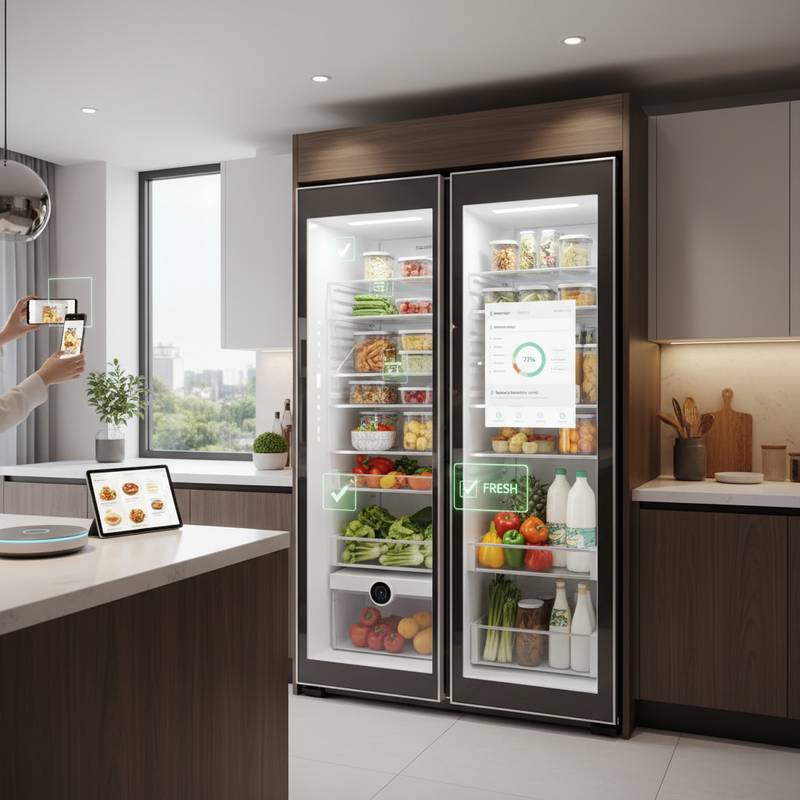Visualize Your Fridge Prioritizing Fresh Ingredients
Picture opening the refrigerator door to discover a yogurt container hidden in the back corner, only to discard it moments later. Food waste affects every household. It begins with well-intentioned purchases and concludes with spoiled produce or uneaten leftovers. AI-powered smart kitchens address this challenge effectively, with expiration tracking emerging as a key tool for waste reduction at home.
Uncovering the Widespread Issue of Kitchen Waste
Households routinely lose money and resources to unused groceries. Individuals purchase items with plans to consume them, yet schedules fill quickly. By the time attention returns to the refrigerator, many products have exceeded their shelf life. This pattern contributes to unnecessary expenses and environmental strain.
The solution presents itself clearly. Smart kitchen technologies now identify food items, monitor their viability, and propose meal ideas before spoilage occurs. Outcomes include diminished waste, improved dietary choices, and tangible financial benefits.
Transforming Daily Routines with Smart Kitchen Innovations
Contemporary smart refrigerators incorporate internal cameras, barcode readers, and AI algorithms to monitor grocery freshness without manual effort. Upon closing the door, the system captures an image, recognizes contents, and maintains an updated inventory log. Access this information via a smartphone application or query a voice assistant for recipe recommendations based on nearing-expiration items.
Such capabilities extend beyond theory into everyday application. Reliability and accessibility define these systems. Integration occurs smoothly into routines, eliminating the need to track milk carton ages or verify poultry safety manually. The refrigerator provides the necessary alerts.
Guide to Implementing Smart Expiration Monitoring
-
Select an Appropriate Refrigerator Model.
Opt for units equipped with built-in cameras and AI identification features. For value-oriented choices, consider the Samsung Bespoke 4-Door Flex, priced near $2,000, which supports inventory management via the SmartThings application. The LG InstaView ThinQ Refrigerator, at approximately $3,000, offers enhanced functionality including door-in-door design and recipe syncing. Premium options like the Bosch Series 800 Smart Refrigerator, around $4,500, include sophisticated sensors for freshness, humidity regulation, and cloud-supported expiration oversight. -
Integrate with Existing Smart Home Systems.
Ensure compatibility with voice assistants such as Alexa or Google Home. This setup enables verbal additions to shopping lists, inquiries about impending expirations, or requests for recipe guidance through spoken commands. -
Activate Ongoing System Enhancements.
These refrigerators receive over-the-air firmware updates via Wi-Fi, refining AI accuracy progressively. Maintain regular updates, as manufacturers frequently deploy enhancements that broaden the visual recognition database for diverse foods. -
Leverage Supporting Applications Effectively.
Platforms like SmartThings, ThinQ, or Home Connect facilitate receipt scanning for quicker data entry. This approach surpasses manual logging and assists AI in verifying item details and dates accurately.
Key Factors to Evaluate Prior to Purchase
Smart refrigerators represent a significant upfront cost, yet they yield enduring returns. Consider a projected durability of 10 years or longer, rendering annual expenses manageable alongside waste-related savings.
For those hesitant about full replacements, alternative devices exist. The Smarter FridgeCam, costing about $180, adds a camera to standard refrigerators and links to an app for visual monitoring. While it lacks the depth of integrated AI, it heightens visibility into fridge contents substantially.
Data security warrants attention as well. These appliances record purchasing patterns, so prioritize brands offering transparent policies and on-device storage. Implement robust passwords and restrict connections to verified third-party services.
Advanced Feature: Personalization Through AI Adaptation
Beyond basic date logging, AI evolves with user patterns. If weekly strawberry purchases lead to frequent discards, the system may recommend reduced amounts or prompt recipes for quicker use. This customization fosters a tailored experience rather than a rigid process.
Lighting technology adds another layer. High-end models employ LED systems with specific wavelengths that inhibit produce degradation. This understated feature prolongs usability by several days, directly contributing to cost reductions.
Realizing Savings and Environmental Gains
Food waste extends impact beyond finances to energy consumption, landfill contributions, and production logistics. AI monitoring heightens awareness, enabling households to lower discards measurably each month. Reports from users indicate grocery savings sufficient to cover device fees within the first year.
Pair the refrigerator with meal-planning tools for added efficiency. Integration with services like Whisk or Tasty generates automated lists that account for existing stock, preventing redundancies and promoting fresher preparations.
Integrate Technology for an Optimized Kitchen
Smart kitchens transcend mere ease; they promote mindful living, waste minimization, and fiscal responsibility. Options range from affordable add-ons to advanced appliances, all backed by proven technology ready for immediate implementation.
Prepare to elevate your kitchen into a collaborative environment. Future refrigerator visits will reveal precise usage guidance, timely preparation strategies, and inspiration for flavorful outcomes.
FAQs
How do AI refrigerators monitor expiration dates?
They employ internal cameras and barcode information to identify products, then reference typical shelf lives or supplier data.
Is retrofitting possible for current refrigerators?
Yes, add-ons such as the Smarter FridgeCam provide essential monitoring without a full upgrade.
Do smart refrigerators work with voice assistants?
Recent models connect seamlessly with Alexa, Google Home, or SmartThings for intuitive control.
How secure is data from smart kitchen appliances?
Select reputable brands emphasizing local storage and explicit privacy controls.
Do these technologies truly lessen waste?
Affirmative; expiration notifications lead to observable reductions in thrown-out food.
Can applications function independently of a smart fridge?
Certain apps support manual entry, although they demand greater user involvement than automated systems.
What price range applies to smart refrigerators?
Budget from $2,000 to $4,500 based on capabilities and manufacturer.
Require professional setup for smart fridges?
Standard installation suffices for most, though advanced units may gain from expert network and sensor alignment.
